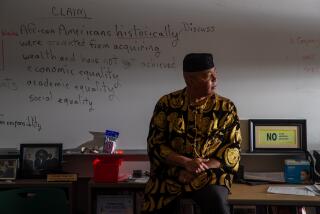Henry Singleton, Co-Founder of Teledyne, Dies : Obituary: Man who led the conglomerate for three decades was known for his technical skills and prowess on Wall Street.
- Share via
Henry E. Singleton, the pioneering co-founder of Teledyne Inc. and leader of the Los Angeles-based conglomerate for more than three decades, died Tuesday of brain cancer at his West Los Angeles home. He was 82.
Singleton, known as soft-spoken and extremely private, gained a mystique on Wall Street as one of the nation’s leading corporate merger whizzes from the 1960s through the 1980s.
He launched Teledyne in 1960 as a semiconductor maker but turned the company into one of America’s biggest and, for a time, one of its fastest-growing business empires. It controlled billions of dollars in assets and owned big stakes in many other companies.
Singleton specialized in finding companies whose stocks were undervalued, gobbling them up and turning them into big profit-makers for Teledyne shareholders. Eventually, Singleton amassed a fortune, estimated last year by Forbes magazine at $750 million--ranking him as one of the nation’s 400 richest people.
“He was way, way ahead of his time in lots of things, both technically and in business,” said Marvin H. Fink, president of Teledyne Electronic Technologies, a Marina del Rey subsidiary of Singleton’s old business empire and an executive acquainted with Singleton since the late 1950s.
Fink pointed out that Singleton designed what for years was a leading missile and aircraft guidance system. In addition, he said, Singleton was quick to embrace such corporate financial maneuvers as spinning off businesses and using extra cash to buy back stock.
“He was the first one I knew who used his own cash to buy back his stock and, for a while, people laughed at him. They thought he should do other things [with his cash]. Nowadays, just about every company understands the value of that,” Fink said.
At the same time, Singleton was reserved both in his personal and professional life. “He had very few interviews,” Fink said. “He was not the kind of guy who would talk a lot to analysts about his company’s stock. He was not the kind of guy who would tout his stock on TV.”
In 1960, Singleton launched Teledyne with his partner George Kozmetsky. Their first venture was building digital computers for military and commercial aircraft and space exploration projects.
Later, the company went on its acquisition binge, acquiring everything from other aerospace companies to metals concerns to WaterPik.
But in the mid-1980s, after conglomerates had fallen out of favor on Wall Street and after Teledyne’s stock began slumping, Singleton turned around and began working on slimming down the company. He and his successor as chief executive, George Roberts, eventually spun off two insurance companies, Unitrin Inc. and Argonaut Group.
Singleton then increasingly yielded management control of the company, and finally relinquished the title of chairman in 1991. He continued, however, to keep a close eye on the company as its dominant shareholder.
Meanwhile, the company’s problems mounted as it was investigated for a range of crimes in its defense business. Teledyne settled charges that it submitted inflated bills to the government, and it also pleaded guilty to falsifying tests on electronic components.
Then, in the mid-1990s, Teledyne found itself in the unaccustomed role of corporate prey--it was the target of a hostile takeover attempt by WHX Corp., parent of Wheeling-Pittsburgh Steel. Singleton responded by lining up a deal with a friendly buyer, Allegheny-Ludlum, and a new company was formed, Allegheny-Teledyne.
Singleton was born in 1916 in Haslet, Texas, on a ranch where his father raised cotton and cattle. He attended the Naval Academy in Annapolis, Md., and later went to the Massachusetts Institute of Technology, where he majored in electrical engineering and earned his bachelor’s degree, master’s degree and doctorate.
In 1951, a year after finishing his studies at MIT, Singleton moved to Los Angeles, where he worked for Hughes Aircraft, North American Aviation and then Litton Industries, before launching Teledyne.
After stepping down from active management of Teledyne, he pursued diverse interests, including cattle ranching in California and New Mexico. He also was a student of Western folklore and the Pueblo Indian culture, a wine collector and a chess and poetry enthusiast.
Singleton served on various boards, including those of Caltech, Apple Computer and Union Bank.
He is survived by his wife of 57 years, Caroline, and by five children and four grandchildren. A memorial service will be held Wednesday at 11 a.m. at All Saints Episcopal Church in Beverly Hills. In lieu of flowers, the family suggests donations to the UCLA Division of Neurosurgery, All Saints Church or St. John’s Hospital.
More to Read
Inside the business of entertainment
The Wide Shot brings you news, analysis and insights on everything from streaming wars to production — and what it all means for the future.
You may occasionally receive promotional content from the Los Angeles Times.










